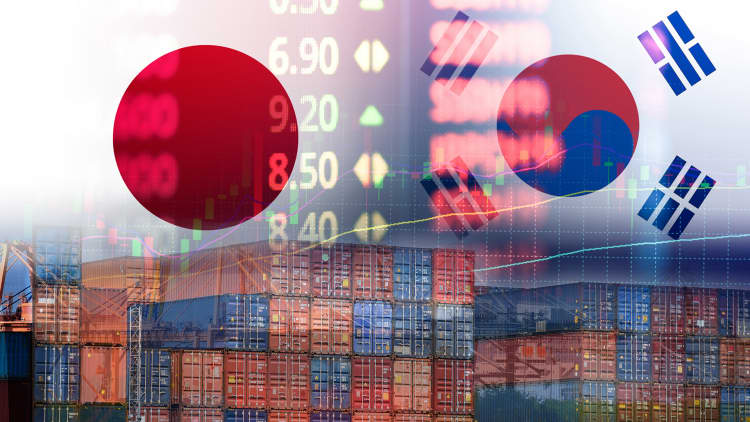South Korea on Thursday said it will scrap an intelligence sharing agreement with Japan, creating possibly serious consequences for the effective monitoring of North Korea.
Recent trade friction between the two Asian powerhouses has morphed into a dispute with political implications that go far beyond the region. One day after the Japanese and Korean foreign ministers met in China to discuss trade and national security, Seoul announced that it isn't in its "national interests" to maintain the intelligence pact.
Both the United States and China have stepped in to mediate.
U.S. Secretary of State Mike Pompeo urged the two countries to work out their differences on Thursday, saying "there is no doubt that the shared interests of Japan and South Korea are important, and they're important to the United States of America."
What is the intelligence agreement?
The General Security of Military Information Agreement, more commonly referred to as GSOMIA, allowed the two countries to directly share information on North Korea's nuclear and missile activities, ensuring that the two U.S. allies are aligned defensively.
The agreement is the first intelligence-sharing agreement between the two nations since Korea's liberation from Imperial Japan in 1945.
In 2011, Seoul, Tokyo and Washington began regional security negotiations focused on Pyongyang's nuclear threats. The deal was formalized in 2016.
"GSOMIA was first supposed to be signed back in 2012 but got delayed from the South Korean side because the locals were against the idea of having an agreement with the Japanese," said Waqas Adenwala, Asia analyst at research firm Economist Intelligence Unit.
'Perplexing move'
Seoul's plan to withdraw from the initiative is probably also driven by such "domestic opposition," Adenwala said.
If Seoul follows through on its threat, South Korea will probably share information with Japan the way it did before GSOMIA was signed — through Washington. That will "create lags" and reduce the effectiveness of the allies' ability to watch North Korea, Adenwala told CNBC earlier this week.
Troy Stangarone, senior director at the Washington-based Korean Economic Institute, said that South Korean President Moon Jae-in's decision "is a perplexing move," because he appeared to be offering "an olive branch" to Japan just days before.

Withdrawing from the intelligence sharing deal means that Seoul will no longer receive quick notification on irregular activities in regional waters — in what Japan calls the Sea of Japan, but which Korea refers to as the East Sea — according to South Korean government sponsored broadcaster Arirang News.
In 2019 alone, Seoul and Tokyo exchanged "classified military information about North Korea 7 times," according to the government-backed broadcaster.
History of animosity
Japan invaded Korea before World War II, and its military involvement in Korea dates back to at least the 18th century. The Korean Peninsula was under Japanese occupation from 1910 to 1945. During that period, many Koreans were forced to work in military brothels and Japanese factories.
Resentment over Japan's brutality during the Second World War lingers today, as do sharp differences over a handful of islands.
Analysts warn that the spiraling dispute has started to cause serious disruptions to the global semiconductor industry. It also damages industries including tourism, airlines and consumer goods in both countries.
— CNBC's Chery Kang and Reuters contributed to this report.
Correction: This story has been updated to reflect the correct title of Waqas Adenwala.


